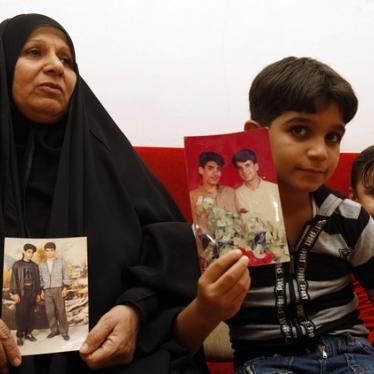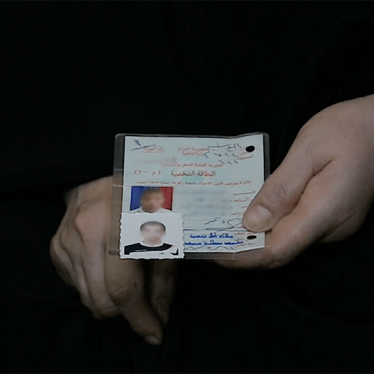Since 2016, I have visited over a dozen camps across Iraq housing families accused of having a father, husband, or son affiliated with the Islamic State (also known as ISIS). I have spent dozens of hours sitting in the tents of women struggling to figure out how they can get out of the camp, where they are effectively being confined by security forces as punishment for what their relative might have done, so they can offer their children the chance to have a normal life. While all these interviews have been heart-breaking, my visit to Ishaqi camp is the one that has haunted me the most.
In early December 2018, after hours of negotiations, a unit of the Popular Mobilization Forces (PMF or Hashad, nominally under the control of the prime minister) finally let me into the infamous camp in Salah al-Din governorate. Unlike other camps, it had no presence or services from international or local organizations. The fighters themselves were the camp’s “management.” Most organizations that tried to enter the camp had been turned back by the fighters, who ran the site as a prison. Of the more than 400 residents, I saw only about 30 men, all older than 60.
At one point I was able to slip away from the fighter assigned to monitor my interviews. The moment he was out of earshot, women stopped talking about the horrific camp conditions, including the lack of fuel and the chronic diseases, and instead started rapidly firing names at me -- dozens and dozens of names of men. They said that a month after security forces brought them to the camp there was a nearby bombing. Afterward, the fighters promptly rounded up all 52 men in the camp between the ages of 17 and 57, accusing them of some link to the bombing, and took them away, along with a few younger boys. Their family members never heard from them again or knew their fate.
For 30 minutes, all I did was write down names, including of boys as young as 10. Before I left, at the request of the women, I tore the filled pages out of my notebook and hid them in my pocket so that the guards would not find them if they searched me.
A few weeks ago my heart sank when I saw a local news article that dispelled any hope that the men whose names I had taken down may be alive, perhaps in a secret prison somewhere. The authorities had just discovered a mass grave next to the camp, which apparently contained the remains of more than 50 people, including children as young as 8 or 10.
I am losing track of the number of times I have documented allegations of killings in Iraq, only to read in the news several months or years later that a mass grave was discovered right where the killings allegedly occurred. And yet I cannot remember a single time where any mass killings by Iraqi forces were investigated.
Until late 2020, tens of thousands of Iraqis, mostly women and children, were living in camps, some that functioned as de facto prisons, because the government and their local community wanted to punish them for their relative’s perceived roles in ISIS by preventing them from returning to a normal life. This changed in October, when the government moved to close all camps across the country, stripping the families of access to food, water, shelter, and health care, and leaving them with nowhere to go and no men left to earn a living.
The authorities closed Ishaqi camp in November. The residents were freed but as with many of the others freed from the camps, other units of fighters are controlling their villages and are not allowing them to return home. So they have been left to fend for themselves. Women across Iraq in the same position have told me and others that they feel unsafe and are at risk of sexual violence.
The mostly women and children who were held prisoner in Ishaqi camp for years deserve to go home, or make a new home elsewhere, and the government should be throwing its full might behind protecting and supporting them.
But these former residents also deserve to know what happened to their loved ones, and impunity for abusive security forces needs to end. The Iraqi authorities can begin to address this apparent atrocity by opening a credible investigation into the incident, starting by locating the former camp residents, many of whom are currently living in squalid conditions in an abandoned train station nearby, to interview them about the details of their relatives’ disappearance and take DNA samples to help identify the remains of those found in the mass grave.
The international community has a role to play too. In 2017 the United Nations Security Council decided to create a team, UNITAD, to help the Iraqi government document and prosecute the grave crimes committed by ISIS, including by exhuming mass graves in Iraq. But it chose to exclude from UNITAD’s mandate investigations into the grave crimes that Iraqi security forces committed in the battle against ISIS.
One-sided justice in Iraq will not serve anyone’s interests, and the families from Ishaqi camp deserve justice for abuses against their loved ones just as much as every victim of ISIS does. The international community needs to have the courage to push as hard for judicial investigations into these abuses as well.









